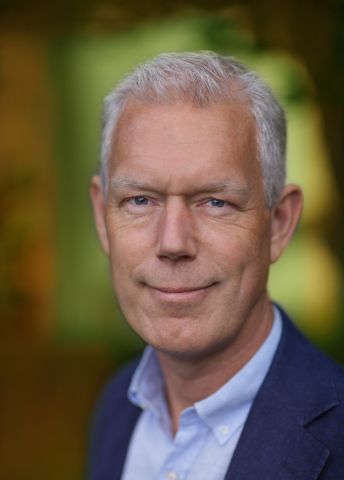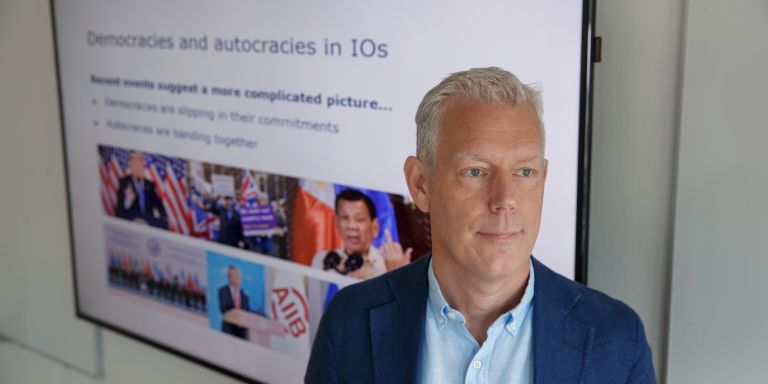
Jonas Tallberg
Professor of Political Science
Wallenberg Scholar
Institution:
Stockholm University
Research field:
International relations, focusing on global and regional cooperation


Wallenberg Scholar
Institution:
Stockholm University
Research field:
International relations, focusing on global and regional cooperation
Based at Stockholm University, Tallberg has researched international politics for many years, specializing in various forms of international cooperation. His earlier research revealed a pattern of democracies having a greater tendency to cooperate than more autocratic states. Democracies have been more active in founding or joining international organizations, advocating free trade and committing to conventions and treaties on human rights and environment.
“Democracies are also better at resolving conflicts. Perhaps they are best known for not going to war with one another – ‘the democratic peace theory’.”
Many earlier studies were made after the fall of the Berlin Wall in 1989. The world experienced a wave of emerging democracies in Eastern Europe and Latin America, and international cooperation blossomed. But over the past few years democratic principles appear to be on the retreat, and support for international cooperation is waning.
“We see democracies sticking less firmly to their international commitments. Meanwhile, autocracies such as China and Russia are increasingly active in forming new organizations, concluding new agreements and making use of them, albeit for autocratic purposes.”
The trend suggests a complicated relationship between countries’ political systems and their participation in international cooperation. Perhaps that relationship has always been more complex, but it couldn’t be properly identified or defined in earlier research,” Tallberg ponders.
He wants to create a more nuanced picture of the way different political systems are linked to international cooperation.He and his team are analyzing data dating back almost 400 years in the hope of showing how democracy and autocracy have influenced international cooperation through the ages.
With the help of funding from the European Research Council, Tallberg has already begun a study on states and international organizations. “We have access to data on international organizations dating back to the early 1800s, which gives us a long time series to work with.”
The Wallenberg Scholar grant enables him to broaden the research, focusing on international agreements and multilateral cooperation. One key resource is the V-Dem project at the University of Gothenburg, which has been gathering detailed contemporary and historical data on democracies.
The researchers plan to build a unique database gathering multilateral agreements from the Treaty of Westphalia 1648 up to the present day. In addition to peace treaties, there are agreements on areas such as trade, human rights and environment, including the Paris Agreement on climate change.
“This database gives us a fantastic opportunity to understand how international cooperation has evolved over time, and how different political systems have impacted this.”
In making their analyses, the researchers are using the latest methods in quantitative text analysis and machine learning. The project also involves qualitative field studies and survey experiments. Tallberg has previously used surveys to study confidence in international organizations among decision makers and citizens.
“We can use survey companies to elicit the views of citizens. But it’s a challenge to reach decision makers, since there are no established panels for these groups.”
The earlier project featured over 800 interviews with people in the upper echelons of politics, civil society, business, academia and the media in six countries and on a global level. It took two years to collect all the data.
“You really need to have a long-term perspective.”
Tallberg wants to adopt a similarly comprehensive approach in the present project. The idea is to survey government officials in ten democracies and autocracies, and citizens in the same countries. Respondents will be asked questions primarily concerning the relationship between political systems and international cooperation.
“One difficulty is getting hold of contact information for government officials and persuading them to take part. This is particularly difficult in countries where questions about democracy may be viewed as sensitive.”
This kind of research is risky, but has great potential.
“If we succeed in carrying out these surveys, it will make an important contribution to understanding international politics and cooperation.”
The Wallenberg Scholar grant offers unique opportunities to get to the bottom of the question of how states approach each other in international cooperation based on their political systems. This is a vital contemporary research topic.
In a time when globalization is being increasingly criticized, it is becoming ever more important to understand how different political systems impact international undertakings. Politicians and government officials face strategic choices, and there are many questions to be considered.
“Should democracies try to cooperate with autocracies to solve global problems, or confine their activities to ‘democratic clubs’ with many shared values? And if they choose cooperation, how should democracies deal with demands to weaken principles governing human rights, civil society and openness, for example? Our research will generate new and relevant answers to questions of this kind,” Tallberg says.
Text Nils Johan Tjärnlund
Translation Maxwell Arding
Photo Magnus Bergström